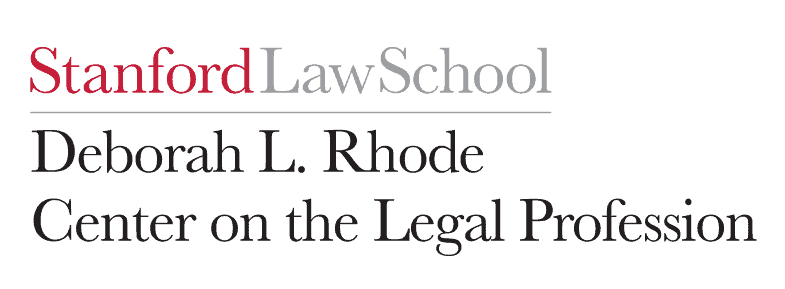We write from CLP to update you on our year so far.
CLP’s academic year began with a two-day celebration of the remarkable life and legacy of Deborah Rhode. On October 15 and 16, 2021, a set of panel discussions covered a broad set of topics befitting Deborah’s wide-ranging influence and enormous impact, both academic and personal. As Paul Brest, former dean and professor emeritus here at SLS, said: “Deborah was a pioneer and leader in every field she touched—sex discrimination, professional responsibility, pro bono legal practice, women and leadership, and just plain leadership.” We are grateful for the opportunity to honor Deborah’s legacy and extraordinary life—and we are so thankful to those of you who joined us, participated remotely, or submitted remembrances from afar. We are also deeply appreciative of the Stanford Law Review’s publication of powerful reflections on Deborah’s lasting imprint at Stanford, in the legal profession writ large, and beyond.
Building on Deborah’s singular talent for conducting original research to understand problems at their root then devising and implementing solutions—which Nora, in her Stanford Law Review Essay, termed “the Rhode Treatment”—we have redoubled our efforts to keep pushing on the issues that matter.
Access to Justice Through Innovation. We continue to play a central role in ongoing attempts nationwide, and here in California, to promote innovation and access to justice through regulatory reform. David and CLP’s Lucy Ricca have been working as appointees to the State Bar of California’s Closing the Justice Gap Working Group, tasked with recommending a design for a regulatory “sandbox” that relaxes lawyer regulation in order to spur innovation in legal services. CLP is also contributing to vigorous debate via original research, writing, and press outreach. A few highlights of this work include an ongoing Policy Lab, this op-ed from CLP’s Jason Solomon, this LA Times editorial, and comments submitted in support of the State Bar’s proposal to create the equivalent of nurse practitioners to work in areas like family law, housing, and debt. Meanwhile, Nora has co-signed an amicus brief in a recent challenge to New York’s unauthorized practice of law (UPL) restrictions, and she recently participated in a roundtable discussion at Northwestern discussing that potentially pathbreaking litigation.

The Filing Fairness Project. Mark Chandler, who joined us last year after ending his remarkable run at Cisco, is co-leading still another project alongside David and Margaret Hagan, leader of the Legal Design Lab. In particular, Mark, David, and Margaret seek to design and launch an ambitious multi-state pilot effort (titled the Filing Fairness Project) to improve civil filing systems. The pilot is bringing together six states—representing roughly 1 in 6 Americans, from Alaska to Virginia—to pave the way for scalable technology that can assist self-represented litigants with acute civil justice needs. Currently, the majority of litigants are pro se—but the forms one must complete in order to vindicate one’s rights (to respond to an eviction notice, say) are bewildering, and they differ across jurisdictions. That difference, along with variable e-filing standards and other administrative burdens, prevents technology providers from offering help at any scale. The Filing Fairness Project will try to change that—with implications that are potentially enormous.

Law and Lawyering into the Digital Future. The Filing Fairness Project is one way we are seeking to maximize technology’s positive impact on the legal system. We are also forging new knowledge on technology’s impact. David’s forthcoming first-of-its-kind book, Legal Tech and the Future of Civil Justice (Cambridge University Press), follows from last year’s conference of the same name and gathers expert voices from CLP and beyond on the future of law and legal practice.
Protecting Consumers and Clients. CLP has also shone much-needed light on important issues in legal ethics, including on witness recantation in criminal cases. Efforts to enhance client protection and participation will continue with a May convening regarding attorney-client relationships in multidistrict litigation—where leading scholars, practitioners, and judges will join us to discuss the present and future of aggregate litigation.

A Stronger, More Diverse Profession. One aspect of strengthening the profession is ensuring that judges have the legitimacy they need in our democracy. We recently co-hosted a discussion on attacks on the judiciary, where Nora was a featured speaker. Nora also recently signed a letter to Chief Justice John Roberts urging the Supreme Court to adopt a Code of Conduct. Meanwhile, Orrick Chair Mitch Zuklie, Diversity Lab’s Caren Ulrich Stacy, and Fenwick Director of DEI Mira Dewji spoke to the class “Reforming the Profession,” co-taught by Jason Solomon and the Rock Center’s Mike Callahan, about the most promising levers and difficult challenges in increasing diversity among lawyers. We are currently considering our next project on how to best make an impact on diversifying the profession—a critical issue and major priority.

The Team. Todd Venook, a Yale Law School graduate and, most recently, a law clerk in the Middle District of Alabama, joined us last fall as our inaugural Civil Justice and Technology Fellow and has already made a significant contribution. We’re also looking to hire a Justice Innovation Lead to drive the Filing Fairness Project through its pilot stage. With our team more fully in place, we’re eager to broaden and deepen CLP’s imprint on critical issues facing the profession.
Many thanks to all of you who support our efforts, engage with our work, and challenge our thinking. We are grateful for your partnership, and we look forward to another successful year.
Nora Freeman Engstrom
Co-Director, Stanford Center on the Legal Profession and Ernest W. McFarland Professor of Law
David Freeman Engstrom
Co-Director, Stanford Center on the Legal Profession and Professor of Law and LSVF Professor in Law
